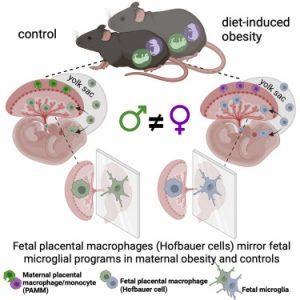A new study offers a glimmer of hope for identifying newborns at risk of neurodevelopmental disorders (Figure 1). The research suggests that analyzing a readily accessible cell type in the placenta – macrophages – may provide insights into the health of fetal brain microglia, immune cells crucial for brain development.
Microglia play a vital role in sculpting neural circuits and regulating development in the fetal brain. However, directly monitoring their health during pregnancy is currently impossible. This creates a challenge for early detection of potential neurodevelopmental issues.
Researchers propose a novel approach: analyzing placental macrophages. Their study reveals that these cells, easily accessible during childbirth, share similar gene expression patterns with fetal brain microglia under normal conditions and in response to environmental challenges.
The study focused on maternal diet-induced obesity as an example of immune activation during pregnancy. This activation can negatively impact microglia development in the fetal brain, potentially leading to neurodevelopmental disorders.
Interestingly, the research revealed a sex-specific effect. Maternal obesity appeared to have a more pronounced impact on placental macrophages and fetal microglia gene expression in male fetuses compared to females. This finding highlights the importance of considering sex differences in future research.
The study goes further, comparing mouse data with existing human datasets. This revealed a remarkable similarity in gene expression patterns of placental macrophages between the two species, suggesting potential clinical applications in humans.
The ability to assess fetal brain health through placental macrophages holds immense promise. This could allow for early identification of infants at risk, paving the way for potential interventions during critical developmental windows to mitigate the effects of prenatal challenges and improve long-term outcomes.
By offering a non-invasive window into fetal brain development, this research paves the way for more personalized fetal health assessments and potentially revolutionizes our approach to preventing and managing neurodevelopmental disorders.
Journal article: Batorsky, R., 2024. Hofbauer cells and fetal brain microglia share transcriptional profiles and responses to maternal diet-induced obesity. Cell Reports.
Summary by Stefan Botha

